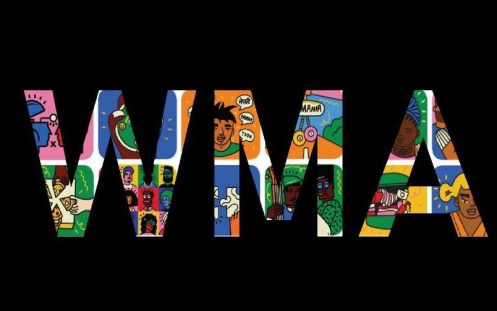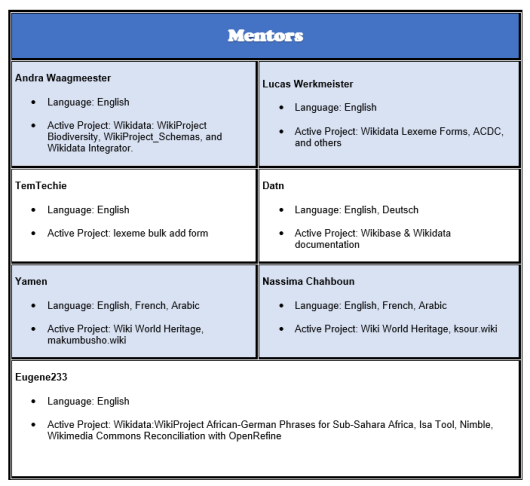An Overview
Mentorship is a relationship between two or more people where the individual with more experience (mentor) can share their knowledge with another individual that has a lesser knowledge (mentee) within their field. Mentorship can be a transformative tool, especially within the technical world, where knowledge transfer and the sharing of insights can accelerate learning and skill acquisition. As a mentee, one can tap into a mentor’s knowledge, gaining practical understanding and insight from an expert who has already navigated a similar path. Wiki Mentor Africa (WMA) was designed with this objective in mind.
What is WMA?
Wiki Mentor Africa is a unique program that guides new and inexperienced developers or programmers within African communities. It provides more than just a foundation for making contributions to Wikimedia. It aims to equip African programmers with the skills to build and maintain Wikimedia tools, pairing them with more experienced contributors who serve as mentors.
Generally, WMA’s broad objectives include developing technical capacity within African Wikimedia communities, promoting skill transfer from more equipped individuals to those less capable, increasing the number of Wikidata tools and their maintainers, and recruiting new Wikimedia Tool contributors.
Furthermore, the program is geared towards fostering collaborations aimed at solving issues peculiar to African communities, ensuring Wikimedia technical skills become less Eurocentric and Organising annual events, conferences, contests for mentors/mentees/the general public.
How did WMA come about?
Founded by the Igbo Wikimedia User Group (IG Wiki UG), WMA was conceived by Udeh Benedict, an IG Wiki UG member. Tochi Precious and Eugene Egbe joined the initiative as outreach and technical coordinators, respectively. Their shared goal was to enhance technical capacity in African Wikimedia communities by mentoring developers for Wikimedia Tool Development. Wikimedia Deutschland played a crucial role in the project’s implementation, providing financial support and guidance.
WMA – The Journey so far
Over the past 12 months, the Wiki Mentor Africa project has made substantial progress towards its objectives of developing technical capacity within African Wikimedian communities and diversifying the development and maintenance of Wikimedia tools. The program has successfully hosted 12 live training events, attracting an average of over 110 participants per event while engaging seven mentors. The mentorship program was widely advertised, leading to a growing Telegram group with over 440 members. The project has so far groomed a group of 22 participants who became mentees and have gained hands-on experience and in-depth knowledge of Wikimedia tools. One year of this project achieved a significant product which is the improvement of the Stub Builder tool. This tool, critical to Wikipedia’s ecosystem (a vital tool for creating Wikipedia stubs) has been upgraded thanks to the efforts of the WMA team.
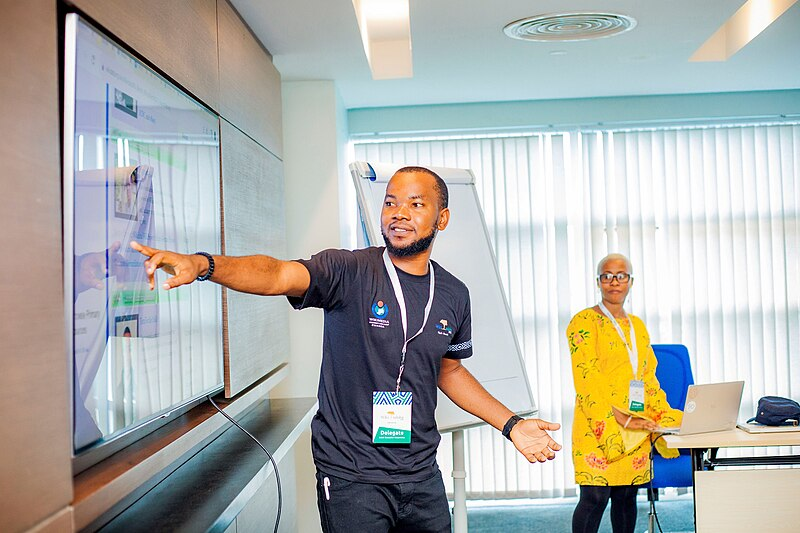
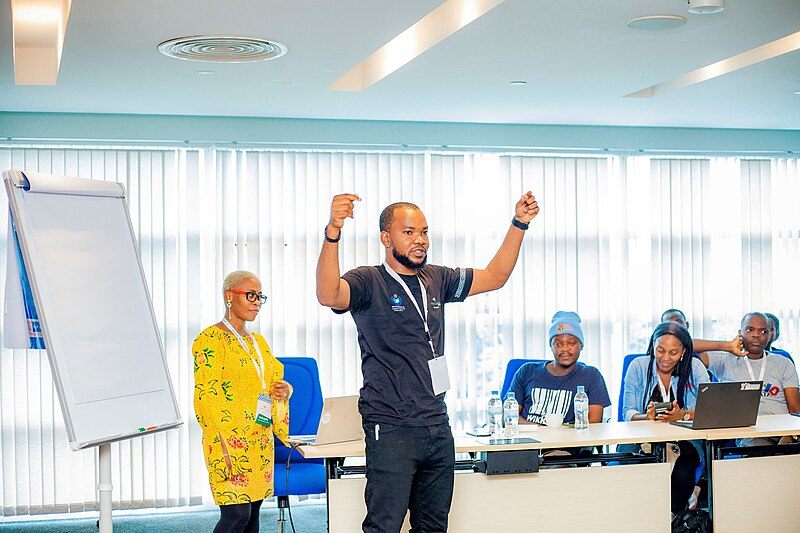
Targets versus what has been achieved
The project made impressive progress on the metrics laid out in her proposal:
Following the target metrics, 12 trainings has been organized and implemented as planned. Seven mentors has so far been attached to the Wiki Mentor Africa program, exceeding the goal of five. 22 participants has so far been adopted as mentees. Over 110 participants became repeat attendees surpassing the goal of 50. More than 440 people were reached through her Telegram group exceeding the goal of 100. One existing tool (the Stub Builder tool) was successfully updated. The Wiki Mentor Africa program has so far hosted participants from Nigeria, Ghana, Cameroon, Rwanda, Burkina Faso etc and in the process trained over 150 young African Wikimedians.
Challenge(s) encountered
Just like any other project, there were challenges that emerged during the one year of operation of WMA. This challenge centered particularly around recruitment and retention of mentors and ensuring continuous engagement and productivity of the mentees. The WMA team is however setting up modalities to overcome these temporary challenges as the overall project has made impressive strides in its planned activities and outcomes.
Next goal of the project
WMA’s next goal is to have at least 10 participants actively contributing to Wikimedia technical projects, a target currently in progress. Additionally, the project aspires to develop a new tool within the next year.
WMA Mentees and their Knowledge dissemination
In terms of knowledge dissemination, WMA mentees have disseminated their newfound knowledge by presenting their work at two conferences, with one presentation publicly accessible at Biss Pensoft. This has significantly helped to develop the technical capacity of African Wikimedian communities, promoting a more diverse and inclusive growth of Wikimedia tools.

Who are the mentors?
Within the period of one year, WMA has had seven mentors who have so far adopted 22 participants as mentees; these mentees have successfully presented their work at two conferences. Below are the mentors, their language(s) and their active projects:
Recognition for Dedication: Mentor and Mentees of the Year
In the past year, WMA has engaged with many mentors and mentees. However, certain individuals have stood out due to their dedication, hard work, and significant contributions.
The Mentor of the Year title goes to Andra Waagmeester. Not only has he been an exceptional mentor, but he has also made significant contributions to several projects. Notably, he led his mentees in upgrading the Wikipedia Stub Builder, a tool critical for creating biodiversity Wikipedia stubs using data from the iNaturalist app. This work is in addition to his active involvement in Wikidata:WikiProject Biodiversity, WikiProject_Schemas, and Wikidata Integrator. His dedication and leadership have had a substantial impact on the Wiki Mentor Africa project and its beneficiaries.
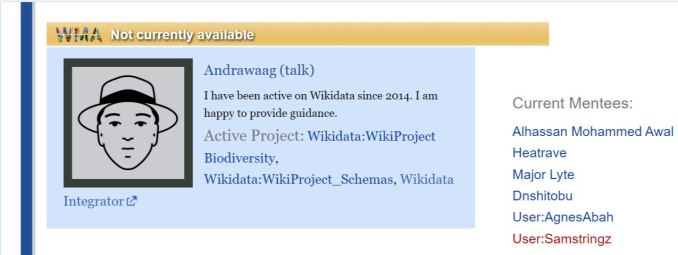
As for the Mentees of the Year, this recognition is awarded to Dnshitobu from Ghana and Agnes Abah from Nigeria. Their enthusiastic participation, eagerness to learn, and their dedication to applying their newfound skills set them apart.
Through their efforts and accomplishments, these individuals have demonstrated the transformative power of the Wiki Mentor Africa project and the broader impact it can have on the African Wikimedian communities.
Summary
The first year of the Wiki Mentor Africa project has laid a strong foundation for future progress and growth. This program serves as a testament to the transformative power of mentorship in empowering communities with the skills and knowledge to shape their own futures.

Can you help us translate this article?
In order for this article to reach as many people as possible we would like your help. Can you translate this article to get the message out?
Start translation
